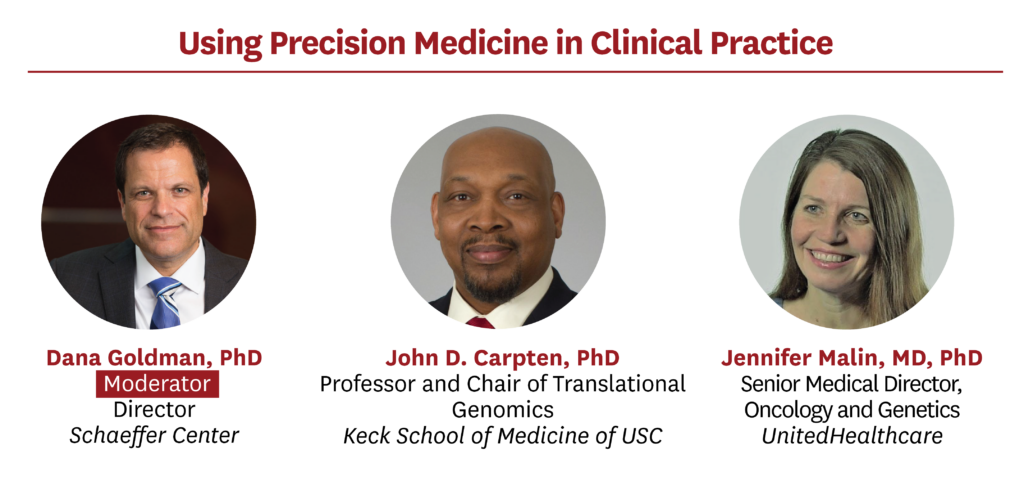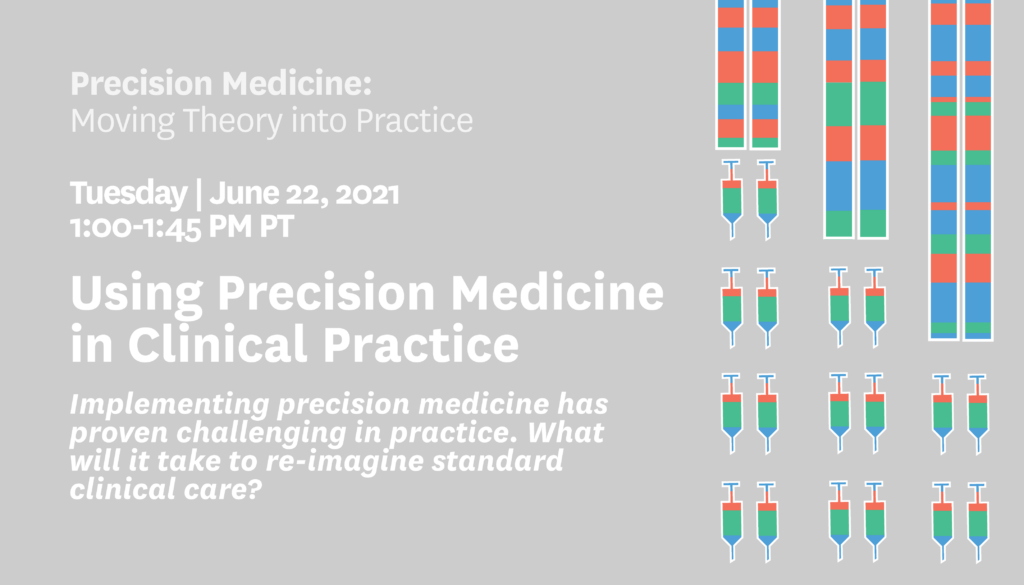Despite its promise and multimillion-dollar federal investments, the development and implementation of precision medicine in routine clinical care continues to be slow. How can we translate theory into practice? Join Schaeffer Center Director Dana Goldman, Professor and Chair of Translational Genomics at Keck School of Medicine of USC John D. Carpten, and United Healthcare Senior Medical Director Jennifer Malin, for a conversation focused on how we can incentivize and accelerate the use of precision medicines to benefit more patients.
This webinar is part of a four-part series on precision medicine. Learn more:
- Event Date
- Tuesday, June 22, 2021
1:00 PM - 1:45 PM Pacific - Location
*Funding for this project was made possible in part by the Agency for Healthcare Research and Quality (AHRQ) (1R13HS026821-01). The views expressed in written conference materials or publications and by speakers and moderators do not necessarily reflect the official policies of the Department of Health and Human Services; nor does mention of trade names, commercial practices, or organizations imply endorsement by the U.S. Government.
 Participant Bios:
Participant Bios:
Dana Goldman, PhD, (Moderator) is the Interim Dean at the USC Sol Price School of Public Policy, as well as the Leonard D. Schaeffer Chair and Distinguished Professor of Pharmacy, Public Policy, and Economics at the University of Southern California. Goldman began serving in his new capacity as interim dean on July 1, 2020. One of his first initiatives is to establish the Price School Social Justice Advisory Board representing faculty, staff and students. He is an elected member of the National Academy of Medicine and the National Academy of Social Insurance – two of his field’s highest honors. He is the author of more than 300 articles and book chapters, and his research has been published in leading medical, economic, health policy, and statistics journals. He has raised over $100 million in funding from external sources—including more than $50 million from the National Institutes of Health. Goldman pioneered the “Netflix model” to improve access to prescription drugs and the value of reduced copayments for the chronically ill. He served as a formal health policy advisor to the Congressional Budget Office, Covered California, National Institutes of Health, and the Fred Hutchinson Cancer Institute. He serves on the editorial boards of Health Affairs and the American Journal of Managed Care and is founding editor of the Forum for Health Economics and Policy. His work has been featured in the New York Times, Wall Street Journal, Washington Post, The Economist, NBC Nightly News and other media. He is former director of ISPOR and ASHEcon and a co-founder of Precision Health Economics, a health care consultancy. Goldman received his B.A. summa cum laude from Cornell University and a Ph.D. in Economics from Stanford University.
John D. Carpten, MD, PhD, is an internationally recognized expert in genome science, and possesses unique training in multiple disciplines including germline genetics for disease risk and predisposition, somatic cancer genomics, health disparities research, cell biology, functional genomics, and precision medicine.
Dr. Carpten earned his Ph.D. from the Ohio State University in 1994 with a focus on human genetics. He then went on to complete a postdoctoral fellowship at the National Human Genome Research Institute, NIH, Bethesda, in Cancer Genetics, where he was later promoted to the tenure track in 2000. Then in 2003, Dr. Carpten accepted a position to become Division Director, Division of Integrated Cancer Genomics, at the Translational Genomics Research Institute (TGen), Phoenix, AZ. Later, in 2012 he was promoted to the position of Deputy Director of Basic Research for TGen. In 2016 he was recruited by the University of Southern California Keck School of Medicine, to build and chair a new Department and Institute of Translational Genomics.
Dr. Carpten’s primary research program centers around the development and application of cutting edge genomic technologies and bioinformatics analysis in search of germ-line and somatic alterations that are associated with cancer risk and tumor characteristics, respectively. A major focus of Dr. Carpten’s research has been related to prostate cancer genetics. He was a lead author on the first genome wide scan for hereditary prostate cancer genes (Science. 1996 Nov 22;274(5291):1371-4.), and the identification of HOXB13 as the first true hereditary prostate cancer gene (New England Journal of Medicine. 2012 Jan 12;366(2):141-9.). His group has also discovered a number of single nucleotide polymorphisms, which confer increased risk of developing prostate cancer (Journal of the National Cancer Institute. 2007 Dec 19;99(24):1836-44.). Furthermore, he has played a critical role in prostate cancer cell biology studies (Nat Genet. 2004 Sep;36(9):979-83.), and prostate cancer tumor genome profiling studies (Genome Res. 2011 Jan;21(1):47-55.).
Dr. Carpten has also been an early pioneer in the understanding the role of biology in disparate cancer incidence and mortality rates seem among underrepresented populations. Through his leadership, the African American Hereditary Prostate Cancer Study (AAHPC) Network was conceived. This study has become a model for genetic linkage studies in underrepresented populations and led to the first genome wide scan for prostate cancer susceptibility genes in African Americans (Prostate. 2007 Jan 1;67(1):22-31.).
Dr. Carpten’ cancer research program spans many tumor types including but not limited to prostate cancer, breast cancer, colon cancer, brain cancer, and multiple myeloma, in addition to several forms of pediatric cancer. He led a landmark study, which culminated in the discovery of the AKT1(E17K) activating mutation in human cancers, published in Nature. This study received an Exceptional rating by the Faculty of 1000, placing the paper in the top 1% of published work worldwide in the area of biology in 2007. It also received a “Must Read” rating, placing the paper in the top 5% of published work in the area of medicine. He extended this work to include an in depth analysis of the functional and mechanistic effects of this mutation on mammary cell biology (Human Mutation). Furthermore, his laboratory participated in and led several high impact studies in Multiple Myeloma research. This includes the seminal study describing common mutation of NF-kB pathway genes in Multiple Myeloma, which was published in Cancer Cell. Importantly, Multiple Myeloma is yet another form of cancer, which disproportionately affects African Americans. Dr. Carpten’s laboratory led the first study to interrogate the somatic features of Multiple Myeloma tumors derived from African American patients, who have higher incidence rates and worse outcomes compared to European descent Myeloma patients (Blood).
Dr. Carpten has also been involved the development and application of high throughput genomic methods and technologies throughout his career. Currently, he has a major focus in Precision Medicine, where Next Generation Sequencing is being applied to interrogate the genomes and transcriptomes of tumors in a clinical setting to identify targetable events for select therapeutics (Molecular Cancer Therapeutics. 2013 Jan;12(1):104-16.) (PLoS Genetics. 2014 Feb 13;10(2):e1004135.). Towards these efforts, he coordinated the development of a CLIA-certified laboratory to support clinical genomic testing. This laboratory was later commercialized as Ashion Analytics, LLC.
Dr. Carpten has received research funding awards from various sources to support his research including NIH, Prostate Cancer Foundation, Susan G. Komen for the Cure, Multiple Myeloma Research Foundation, and a number of pharmaceutical companies. Dr. Carpten has co-authored over 160 publications in scientific journals that include Science, Nature, Nature Genetics, Genome Research, Cancer Research, Molecular Cancer Research, Cancer Cell, and the New England Journal of Medicine.
It is his hope that this work will one day lead to improvements in knowledge based therapeutics toward improvements in outcomes for cancer patients.
Jennifer Malin, MD, PhD, is a Senior Medical Director, Oncology and Genetics, at UnitedHealthcare. In this role, she provides clinical and strategic leadership for improving the health and outcomes of cancer and genomic medicine for United Healthcare members.
After graduating from Harvard University, Dr. Malin received her medical degree and doctorate in public health from UCLA. She is board certified in internal medicine and medical oncology. A Clinical Professor of Medicine at the UCLA David Geffen School of Medicine, she is the author of more than 100 peer-reviewed articles and is widely recognized for her research on the quality of cancer care. She has served on a number of advisory boards and national committees, including the American Society of Clinical Oncology’s Quality of Care Committee and the National Quality Forum’s Cancer Steering Committee. Prior to joining UnitedHealthcare, she was the architect of the cancer care quality program at Anthem.
Dr. Malin continues her clinical practice by volunteering at the Veterans Affairs Greater Los Angeles Health Care System. She lives in Santa Monica, California with her two children and three dogs.




You must be logged in to post a comment.